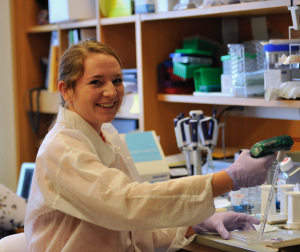Two Penn Derm MD/PhD candidates are awarded F31 fellowships from NIAMS
Ellen White and Jordan Harris, both MD-PhD candidates have recently been awarded Kirschstein-NRSA F31 fellowships from National Institute of Arthritis and Musculoskeletal and Skin Diseases (NIAMS). The NIH describes the purpose of the Kirschstein-NRSA program to “enable promising predoctoral students with potential, to develop into productive, independent research scientists, to obtain mentored research training while conducting dissertation research.”
Ellen is a PhD candidate in Microbiology, Virology, and Parasitology in the lab of Dr. Elizabeth Grice, PhD. Her research focuses on how bacteria that colonize chronic wounds impact wound healing. Alcaligenes faecalis is a bacterium found in the environment, but also identified in the microbiome of chronic wounds where it rarely causes infection. She has demonstrated that A. faecalis aids in wound healing by eliciting a cytokine response in keratinocytes. The main goal of her proposal is to further characterize this mechanism. She hypothesizes that secreted molecules from A. faecalis augment IL-6 signaling to promote the re-epithelialization and healing of wounds. The F31 fellowship will support her as she investigates this mechanism and gathers data that can inform the development of novel therapeutics.
Jordan is a PhD candidate in Immunology and is conducting his thesis research jointly between the labs of Elizabeth Grice, PhD and Taku Kambayashi, MD, PhD. Dr. Kambayashi is a recipient of an SBDRC P&F award, and the Grice-Kambayashi collaboration was a result of Dr. Kobayashi’s foray into skin research. His lab recently discovered that sebum, which plays key roles in moisture retention and defense against infection in the skin, is regulated by the immune system.
Jordan’s previous work demonstrated that sebum secretion is disrupted with the lack of the thymic stromal lymphopoietin (TSLP) receptor and has identified an immune-mediated regulatory circuit. In his proposal, Jordan seeks to understand the role of the skin microbiota in this regulation. He hypothesizes that the skin microbiota promotes T-cell dependent sebum secretion that is mediated by the TSLP-receptor, and this ultimately promotes skin barrier function and prevents against infection. Jordan hopes that further study of this immune circuit will aid in creating novel therapeutics for common skin conditions.
In addition to his excitement about the research his fellowship will support, Jordan recognizes. how application process has prepared him for his future career goals. He explains, “Applying for an NIH fellowship was an incredible learning experience in many ways. My scientific career before now has been focused on learning techniques and synthesizing my findings into novel hypotheses, but it’s difficult to experience first-hand many of the ‘non-benchwork’ roles of being an academic. The NIH F31 application process gave me a ton of insight not only in the act of effectively communicating my ideas, but also in navigating the interface with both the NIH institutes as well as internal collaborations. I feel lucky and grateful to have had my project funded in large part due to the support of my mentors Elizabeth Grice and Taku Kambayashi as well as many collaborators but having the opportunity to share my science and ideas with the NIH for the first time was an unforgettable experience in itself.”
Congratulations, Ellen and Jordan!
Story by Preeti Bhanap
Jordan Harris
MD, PhD Candidate in Immunology
Penn Derm T32 Predoctoral Fellow
Grice and Kambayashi Labs
The trigger and homeostatic function of a novel immune-sebum circuit
Ellen White
MD, PhD Candidate in Microbiology, Virology and Parasitology
Penn Derm T32 Predoctoral Fellow
Grice Labs
Skin microbial-based mechanisms of accelerated wound healing



